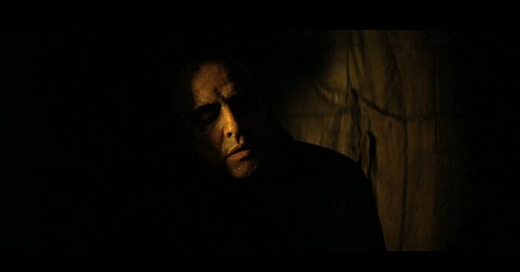When I began reading Serious Literature just under 30 years ago, I instinctively focused on fiction; I didn’t see much point reading history, as I felt I would just forget all the details, whereas I could forget plot details about e.g. Heart of Darkness and still retain something of the broad philosophical patterns, on subconscious & barely-conscious levels: so I might forget the character names, the plot but have a sense of the fragility of sanity & civilisation, of the Heideggerian violence underlying our mundanity, of “the horror”.
Note: with this kind of learning, the fundamental pattern is applicable across multiple domains, otherwise it is not wisdom but rather stuff for machine learning; just as one only knows a face when it can be viewed from different angles, even in the shadows
even made-up
The crucial thing, for human understanding, is to perceive & comprehend in depth - to see similitude & contrast where a machine would not, and to not merely see but to meaningfully evaluate.
Over time I’ve shifted to reading more non-fiction, though as expected I forget almost everything. For example, I read Amanda Foreman’s biography, Georgiana: Duchess of Devonshire, last year, and while it was very good and I retain a vague sense of the social milieu, I’ve almost wholly forgotten the names, the dates, everything important. Ten years ago, I read a lot of books about the Winter War, about Germany in the 1930s, especially concerning the various Intelligence agencies & operations, and today I remember almost nothing. I’m amazed at historians like Thomas777, who can remember the broad overview and the details of some minisculia of the 20th Century.
By contrast, with an hour to prepare I could probably write an essay about novels I haven’t read for two decades, like The Great Gatsby, Jane Eyre, The Magic Mountain. My sense is that fiction communicates patterns of experience which we inevitably absorb; even if we forget characters’ names, plot details, we still remember the essential shapes of fate & action.
I’m currently editing a novel I began 21 years ago. I’ve gone from hoping a publisher would accept & boost it; to planning to self-publish and become a minor success; to planning to self-publish and be read by my friends and maybe a few others; to - finally - self-publishing and being totally unread.
The latter case was my experience with my last book, 5 years ago. I gave away 5 copies and only one recipient read it, presumably out of a sense of obligation. The person to whom I dedicated it said he wouldn’t read it because he already knew the information in the book and so it would be superfluous and a waste of his time to even look at it. The other recipients probably just threw their copies away.
I accepted that my friends are basically illiterate: they can (just about) read, but tackling a book is, for them, a gruelling chore on a par with toilet cleaning. They are, after all, modern. With my novel, I’ve come to accept that I’m in an unenviable position: most novels are read by women; most women are left-wing; I am not left-wing. While the novel is apolitical, it is ardently traditionalist and by now highly old-fashioned; and given my online views the average Box Wine Aunt wouldn’t look favourably on anything of mine.
Well, what about right-wing novel readers…? Well…they don’t exist. My impression, over more than a decade, is that right-wingers either don’t read or only read books about race and IQ/crime statistics, history, or political philosophy. In the comments section of an Imperium Press Telegram post, another commentator brusquely informed me that fiction is “a time sink” unless it is short fiction like Harrison Bergeron. We should, presumably, not waste time on Shakespeare or Tolstoy, Henry James or Fitzgerald: they are “time sinks”. We should be hitting the gym, training with weapons, going to protests, pumping iron, sparring, roaring, taking testosterone supplements, watching Joe Rogan, or something, anything rather than reading the inherited treasury of Western civilisation.
I don’t regret reading so many novels and short stories. Being a bit autistic and highly introverted, I required fiction to forcegrow my societal/psychological awareness. As I see it, we absorb “life lessons” from our experience, e.g. that a certain behavioural pattern is good or bad news; and fiction can accelerate this. While I don’t like to reduce reading to some drearily utilitarian activity, I remember many years ago a girl going missing in my neighbourhood; the chavdad or uncle went on TV and said “I love her to bits!” - this chimed with a Theodore Dalrymple essay I had read (it was written before this incident, regardless of the website date), and with one of my illiterate friends telling me that her physically violent borderline personality disorder left-wing activist daughter would repentantly shriek “I love you to bits!!!”, after acts of violence. When I saw the chavdad/uncle whining how he loved his missing daughter/whatever “to bits!!!” the whole thing came together in my mind in one moment, and I thought, “he’s guilty as sin”. And so indeed it turned out to be.
One may absorb “life lessons” from other people, and from essays, and from novels, on top of whatever we can garner from our own. As we live, we unconsciously absorb information about not merely human behavioural patterns, but more broader patterns of cause & effect; so e.g. I’ve found it unwise to say or write anything I don’t mean, as this often attracts a seemingly ironic comeuppance. Most people don’t seem to learn much from their lives, and just blunder through the same disastrous situations, again and again; but there is always the possibility, the salvific potential, of mastering and so escaping these torments.
For me, fiction is a concentrated form of life experience, reduced to essentials. If I think of key moments in my life, there were many extraneous details which as it were cloud what was essential. In a novel, everything should be essential. One could compare life and fiction thus: our lives are like eating what comes to us, and hoping we can extract what nutrition we require; fiction is like taking multivitamin pills and supplements in concentrated form. Fiction alone is not enough; but nor, I deem, is life.
For me at least, reading & studying & writing essays about literature has been a means of forcegrowing my sense of reality, of what it is to be a human being in this world. If that seems absurd to people today, I would say, Well, I’m not a modern man.
And although our Gradgrinds dismiss fiction, I note that they will nonetheless watch feature films and TV dramas. My sense is that those who dismiss fiction don’t have a problem with fiction per se: they just don’t like reading - and so they can only bring themselves to read when they are taking in what they consider useful information. Otherwise it’s too taxing for their modern, machine-like brains.
I don’t know anyone who is sincerely uninterested in fiction, it’s just that most people today - Tiktok Twitter types - hate reading and so turn instead to the latest superhero film or computer game. Fiction itself seems a universal constant in human society - perhaps as a means of forcegrowing experiential wisdom; and in an illiterate age such as ours, it’s unsurprising that modern men turn instead to computer games and TV, and so can no longer access the treasures of their already forgotten culture.








....btw, I've found that the market place free book offers in kindle direct publishing allow me to circulate my various low-rate grumble stories to a limited audience at least, which amuses.
Stories are our way, and always have been, of making sense of our world and our place in it. The reason why people have less interest in literature is perhaps because they now mistake story for entertainment and story has been forced to fit into entertainment through the medium of TV. Meaning, they realise, can be cheated, so long as the story contains the accepted format of something meaningful, cribbed from stories of past, it has paid its lip-service and the entertainment can be pasted heavily on top like those grotesque doughnuts they sell to the broccoli heads. People today are scared to engage with their world and their place in it, afraid of facing meaning in any real way. They seek distraction and diversion. TV is great for this. Literature is too raw, too poignant, too transformative.